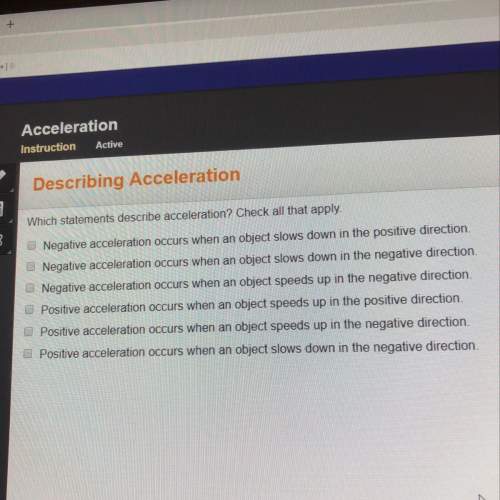
Physics, 27.08.2019 10:00 blahhhhhhh10
The theory of evolution explains that species change in small ways through a gradual process of natural selection that occurs over the course of many generations. these small changes can eventually lead to entirely new species. if a scientist discovered a sequence of dna that links the manatee (a marine mammal) to their land-dwelling ancestors, which explains the likely effect of this discovery on the theory of evolution?
a. the new discovery will cause the theory to be modified because it adds to current knowledge.
b. the new discovery will cause the theory to be dismissed because it contradicts it.
c. the new discovery will further deny the theory because it presents evidence that contradicts it.
d. the new discovery will further support the theory because it presents evidence that supports it.

Answers: 2


Another question on Physics

Physics, 21.06.2019 18:00
Aproton is projected toward a fixed nucleus of charge +ze with velocity vo. initially the two particles are very far apart. when the proton is a distance r from the nucleus its velocity has decreased to 1/2vo. how far from the nucleus will the proton be when its velocity has dropped to 1/4vo?
Answers: 3

Physics, 22.06.2019 07:30
30 points - when can a theory be modified if a new type of technology allows for new observations that raise new questions? a. immediately, while the questions about the theory are being asked b. after new hypotheses related to the theory are tested in experiments c. only after the new observations disprove all parts of the theory d. while scientists begin to think about how the theory could improve
Answers: 1

Physics, 22.06.2019 18:30
Anonzero net force acts on a particle and does work. which one of the following statements is true? the kinetic energy of the particle changes, but the speed of the particle does not change. the kinetic energy of the particle does not change, but the speed of the particle does change. the kinetic energy of the particle changes, but the velocity of the particle does not change. the kinetic energy and the speed of the particle change, but the velocity of the particle does not change. the kinetic energy, speed, and velocity of the particle change.
Answers: 1

Physics, 22.06.2019 19:40
Two charged particles, q1 and q2, are located on the x-axis, with q1 at the origin and q2 initially at x1 = 12.2 mm. in this configuration, q1 exerts a repulsive force of 2.62 µn on q2. particle q2 is then moved to x2 = 18.0 mm. what is the force (magnitude and direction) that q2 exerts on q1 at this new location? (give the magnitude in µn.)
Answers: 1
You know the right answer?
The theory of evolution explains that species change in small ways through a gradual process of natu...
Questions

Advanced Placement (AP), 17.02.2021 23:20

Spanish, 17.02.2021 23:20

Mathematics, 17.02.2021 23:20


History, 17.02.2021 23:20




Mathematics, 17.02.2021 23:20

Mathematics, 17.02.2021 23:20

History, 17.02.2021 23:20


French, 17.02.2021 23:20

Advanced Placement (AP), 17.02.2021 23:20



English, 17.02.2021 23:20

Biology, 17.02.2021 23:20


Chemistry, 17.02.2021 23:20




